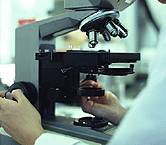Adult Stem Cells Help Those With Immune Disorders, Heart Disease
Analysis of studies finds modest benefit with both conditions.
|
E-mail this article
Subscribe to news
Printer friendly version
|

(SOURCE: Journal of the American Medical Association, news release, Feb. 26, 2008)
TUESDAY, Feb. 26 (HealthDay News) -- Treatment with adult stem cells harvested from blood or bone marrow may benefit some patients with certain kinds of cardiovascular disorders and autoimmune diseases, a new U.S. analysis shows.
There are two types of stem cells, according to background information in the study. Embryonic stem cells are harvested from embryos four to five days after fertilization. Adult stem cells are located in tissues throughout the body and provide a reservoir for replacement of damaged or aging cells.
While stem cell therapy shows great promise, "clinical application has lagged due to ethical concerns [over embryonic stem cells] or difficulties harvesting or safely and efficiently expanding sufficient quantities," the review authors noted. "In contrast, clinical indications for blood-derived [from peripheral or umbilical cord blood] and bone marrow-derived stem cells, which can be easily and safely harvested, are rapidly increasing."
Dr. Richard K. Burt, of the Northwestern University Feinberg School of Medicine, and colleagues examined hundreds of studies of blood- or bone-marrow derived stem cells that were conducted between January 1997 and December 2007 -- 323 assessed feasibility and toxicity, and 69 looked at patient outcomes.
The review found that in 26 studies involving a total of 854 patients with autoimmune diseases there was a treatment-related death rate of: less than 1 percent (two of 220 patients) for nonmyeloablative (not causing bone marrow suppression); less than 2 percent (three of 197 patients) for dose-reduced myeloablative; and 13 percent (13 of 100 patients) for intense myeloablative regimens -- those including total body irradiation or high-dose busulfan, a drug used to treat some forms of chronic leukemia.
"While all trials performed during the inflammatory stage of autoimmune disease suggested that the transplantation of hematopoietic [formation of blood or blood cells] stem cells [HSCs] may have a potent disease-remitting effect, remission duration remains unclear, and no randomized trials have been published," the review authors wrote.
In 17 studies of 1,002 heart attack patients, 16 studies of 493 patients with chronic coronary artery disease, and three meta-analyses, there was evidence suggesting that adult stem cell transplantation may help lead to modest improvements in cardiac function among people with coronary artery disease.
More clinical trials are needed to determine the most appropriate stem cell type, dose, method, timing of delivery -- as well as adverse effects -- to treat cardiovascular and immune diseases and other disorders, the review authors concluded.
The study is published in the Feb. 27 issue of the Journal of the American Medical Association.
More information
The U.S. National Institutes of Health has more about stem cells.
Copyright © 2008 ScoutNews, LLC. All rights reserved. 
HealthDayNews articles are derived from various sources and do not reflect federal policy. healthfinder.gov does not endorse opinions, products, or services that may appear in news stories. For more information on health topics in the news, visit the healthfinder.gov health library.